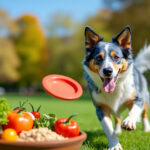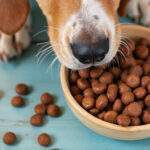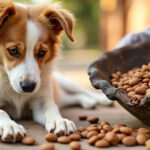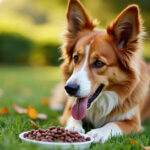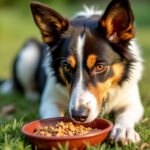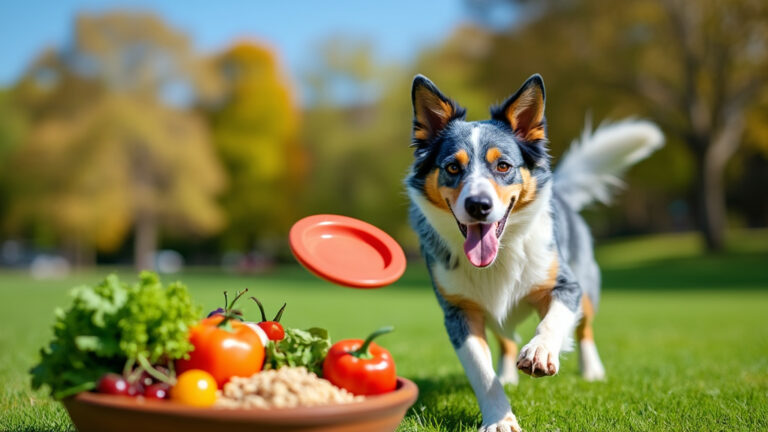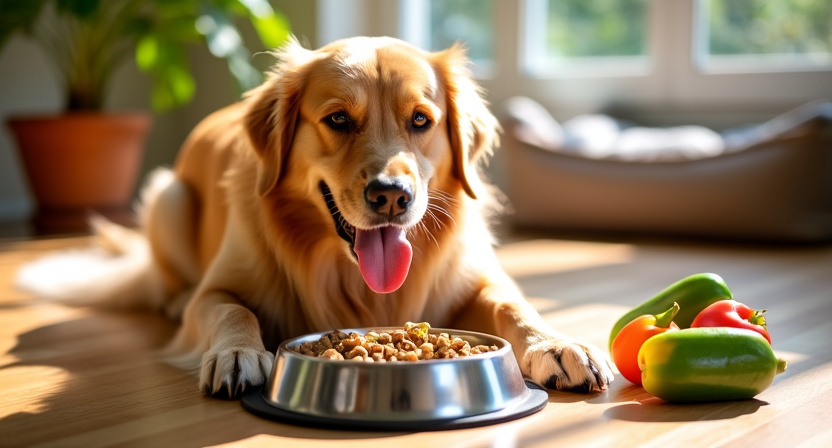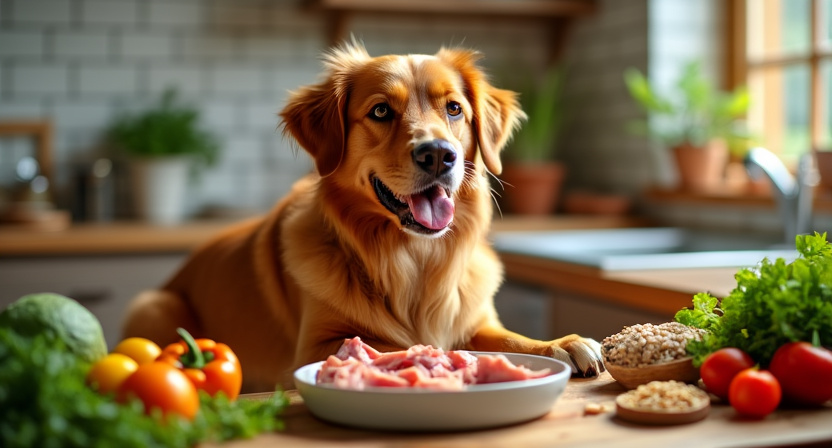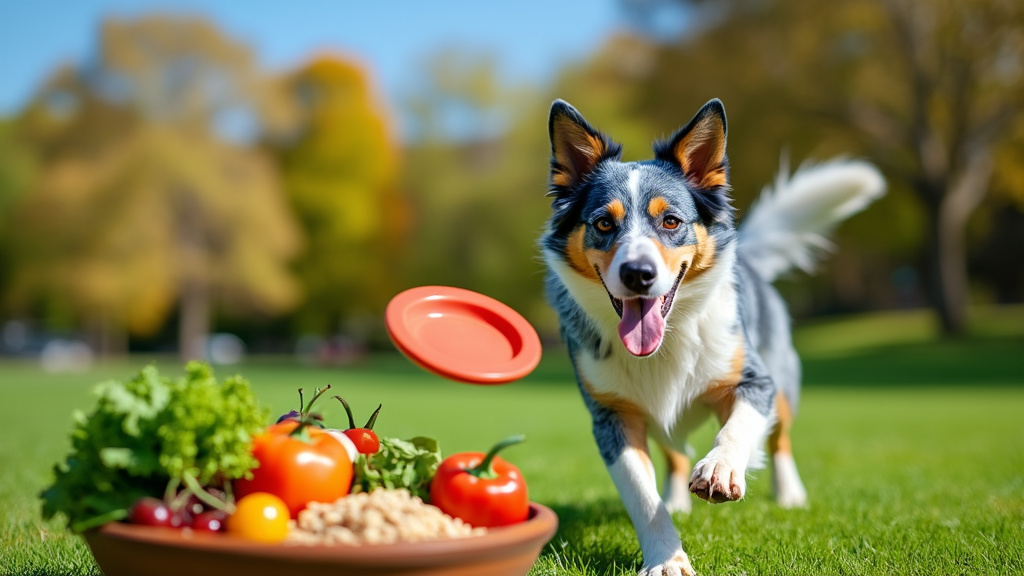Blue Heelers thrive on a diet packed with premium animal-based protein, containing 20-30% to fuel their energetic nature and maintain muscle. I recommend balancing macronutrients with 10-15% fat and 50-60% carbohydrates for peak health. Don’t forget to include omega-3 and omega-6 fatty acids to keep their coat shiny and boost overall health.
Table of Contents
ToggleKey takeaways:
- Pick dog foods with 20-30% protein from top-notch animal sources
- Opt for complex carbs like sweet potatoes, peas, and brown rice for long-lasting energy
- Adjust the diet based on your Blue Heeler’s age, from puppy to senior
- Explore dehydrated, limited ingredient, or fresh custom meal options
- Check with a vet for personalized nutrition guidance and potential supplement needs
Understanding Blue Heelers’ Nutritional Needs
Blue Heelers thrive on a diet packed with high-quality animal-based protein. I recommend aiming for 20-30% protein content in their food to support their active lifestyle and muscle maintenance. Balanced macronutrient ratios are key, with 10-15% fat and 50-60% carbohydrates rounding out their dietary needs.
Essential Nutrients for Optimal Health
Essential fatty acids play a crucial role in your Blue Heeler’s well-being. Omega-3 and omega-6 fatty acids are particularly important for maintaining healthy skin, a shiny coat, and supporting overall health. I suggest looking for dog foods that include fish oil or flaxseed as sources of these beneficial fats.
Complex carbohydrates are vital for providing sustained energy throughout the day. Here are some excellent options to look for in your Blue Heeler’s food:
- Sweet potatoes
- Peas
- Brown rice
These ingredients offer slow-releasing energy, helping to keep your dog active and energized without causing rapid blood sugar spikes. By focusing on these nutritional aspects, you’ll ensure your Blue Heeler gets the balanced diet they need to stay healthy and vibrant.
Tailoring Diet to Life Stages
Puppy Nutrition
Blue Heeler puppies thrive on high-protein, calorie-rich diets. I recommend puppy-specific food until they’re 12-18 months old. This supports their rapid growth and development. Look for formulas with quality protein sources and essential nutrients for bone health.
Adult and Senior Diets
Adult Blue Heelers need balanced nutrition adjusted to their activity level. Active dogs might benefit from performance formulas, while less active ones require portion control to maintain a healthy weight. For senior dogs, I suggest lower-calorie options with added glucosamine and chondroitin for joint support. These ingredients help maintain mobility as your Blue Heeler ages. Remember, transitioning between life stage diets should be gradual to avoid digestive upset.
Top Recommended Dog Foods for Blue Heelers
Dehydrated and Limited Ingredient Options
I’ve found that dehydrated whole grain chicken recipes work wonders for Blue Heelers. These meals typically include free-range chicken, barley, potatoes, peas, and carrots, providing a balanced diet. For sensitive stomachs, limited ingredient diets with chicken or white fish, quinoa, spinach, and sweet potatoes are excellent choices.
Fresh and Customized Meals
Brands like Farmer’s Dog, Ollie, and Nom Nom offer fresh, balanced meals approved by nutrition experts. These customized options cater to your Blue Heeler’s specific needs. To add variety and boost nutrition, I recommend functional pour overs. They’re an easy way to introduce extra nutrients and flavor to your dog’s diet.
Incorporating Fresh Foods and Hydration
Boosting Nutrition with Fresh Additions
I recommend adding fresh fruits and vegetables to your Blue Heeler’s diet to provide essential vitamins, minerals, and antioxidants. Safe options include carrots, green beans, sweet potatoes, and apples (without seeds). These nutritious extras can complement your dog’s main meals and serve as healthy treats.
However, it’s crucial to avoid toxic foods that can harm your Blue Heeler. Steer clear of:
- Grapes and raisins
- Chocolate
- Onions and garlic
- Products containing xylitol
Proper hydration is key for your Blue Heeler’s health. Always provide fresh, clean water and change it regularly. To increase fluid intake, consider adding wet food to their diet. This can be especially helpful for active dogs or during hot weather.
Wet food offers several benefits:
- Higher moisture content
- Often more palatable
- Can help maintain urinary tract health
By incorporating these fresh additions and focusing on hydration, you’ll support your Blue Heeler’s overall health and well-being.
Avoiding Harmful Ingredients and Considering Supplements
Steering Clear of Fillers
I always recommend avoiding certain ingredients in Blue Heeler dog food. Corn, wheat, and soy are common fillers that can trigger allergies and cause digestive problems. These fillers offer little nutritional value and can lead to unnecessary weight gain. Instead, opt for foods with high-quality protein sources and wholesome grains like brown rice or quinoa.
Beneficial Supplements for Blue Heelers
Adding specific supplements can boost your Blue Heeler’s health:
- Fish oil: Rich in omega-3 fatty acids, it supports coat health and reduces inflammation.
- Glucosamine: Helps maintain joint health, especially important for active breeds.
- Probiotics: Improve digestive health and boost the immune system.
Before adding any supplements to your dog’s diet, it’s crucial to consult with your veterinarian. They can provide guidance on the right dosage and whether these supplements are necessary for your Blue Heeler’s specific needs. Remember, a balanced diet is key, and supplements should complement, not replace, a nutritious meal plan tailored to your Blue Heeler’s age, activity level, and health status.
Adjusting Diet for Optimal Health
Portion Control and Activity Level
I can’t stress enough the importance of proper portion sizes for Blue Heelers. These active dogs need the right amount of food to maintain their energy levels without gaining excess weight. I recommend adjusting portions based on your dog’s activity level and body condition. For example, a working Blue Heeler might need more calories than one who’s primarily a family pet. Keep an eye on your dog’s waistline and ribs – you should be able to feel the ribs easily but not see them.
Veterinary Guidance for Personalized Nutrition
To ensure your Blue Heeler’s diet meets their specific nutritional needs, consult with a veterinarian. They can provide tailored advice based on your dog’s age, health status, and lifestyle. Regular check-ups are crucial to monitor your dog’s overall health and adjust their diet as needed. During these visits, your vet can assess:
- Body condition score
- Weight trends
- Coat and skin health
- Energy levels
By working closely with your vet, you’ll be able to fine-tune your Blue Heeler’s diet, ensuring they get the right balance of nutrients for optimal health and longevity.
Sources:
iHeartDogs
The Honest Kitchen
EFR Farm and Ranch
Petabolix
Frequently Asked Questions
What is the recommended protein content for Blue Heelers?
The recommended protein content for Blue Heelers is 20-30% to support their active lifestyle and muscle maintenance.
What are the ideal macronutrient ratios for Blue Heelers?
The ideal macronutrient ratios for Blue Heelers are 20-30% protein, 10-15% fat, and 50-60% carbohydrates.
What are some good sources of essential fatty acids for Blue Heelers?
Good sources of essential fatty acids for Blue Heelers include fish oil and flaxseed, which provide omega-3 and omega-6 fatty acids.
What type of carbohydrates are best for Blue Heelers?
Complex carbohydrates like sweet potatoes, peas, and brown rice are best for Blue Heelers, providing slow-releasing energy.
How long should Blue Heeler puppies be fed puppy-specific food?
Blue Heeler puppies should be fed puppy-specific food until they’re 12-18 months old.
What dietary considerations are important for senior Blue Heelers?
Senior Blue Heelers benefit from lower-calorie options with added glucosamine and chondroitin for joint support.
What fresh foods can be added to a Blue Heeler’s diet?
Safe fresh foods to add to a Blue Heeler’s diet include carrots, green beans, sweet potatoes, and apples (without seeds).
What foods should be avoided for Blue Heelers?
Foods to avoid for Blue Heelers include grapes, raisins, chocolate, onions, garlic, and products containing xylitol.
What supplements can be beneficial for Blue Heelers?
Beneficial supplements for Blue Heelers include fish oil, glucosamine, and probiotics, but consult with a veterinarian before adding any supplements.
How should portion sizes be determined for Blue Heelers?
Portion sizes for Blue Heelers should be adjusted based on their activity level and body condition, with guidance from a veterinarian.




